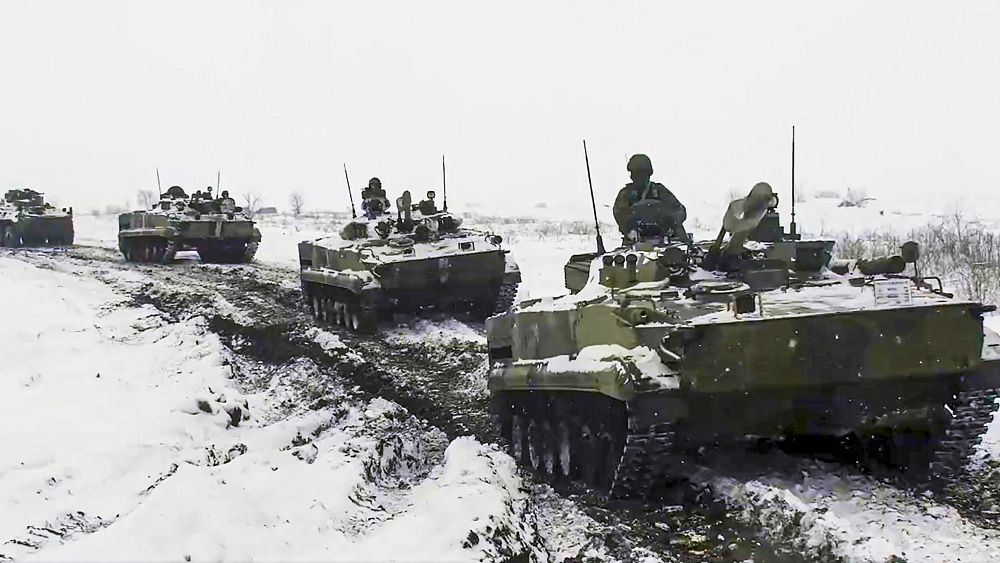
The US rejection of Russia’s main demands to resolve the crisis over Ukraine left “little ground for optimism,” the Kremlin said on Thursday, but added that dialogue was still possible.
It came after the US and the Western alliance firmly rejected any concessions on Moscow’s main demands on Wednesday, refusing to permanently ban Ukraine from joining NATO and saying allied deployments of troops and military equipment in Eastern Europe are nonnegotiable.
All eyes are now on President Vladimir Putin, who will decide how Russia will respond amid fears that Europe could again be plunged into war.
Kremlin spokesman Dmitry Peskov told reporters that the response from the US — and a similar one from NATO — left “little ground for optimism”.
But he added that “there always are prospects for continuing a dialogue, it’s in the interests of both us and the Americans”.
‘No positive response to main issue’ — Lavrov
Foreign Minister Sergei Lavrov said the US response contained some elements that could lead to “the start of a serious talk on secondary issues,” but emphasized that “the document contains no positive response on the main issue.”
The key demands from Moscow are that NATO do not expand and that the alliance refrain from deploying weapons that might threaten Russia.
Lavrov said top officials will submit their proposals to Putin, and Peskov stated that the Russian reaction would come soon.
Peskov added that Putin and US President Joe Biden will decide whether they need to have another conversation following two calls last month.
The US Secretary of State said Washington had made no concessions to the main Russian demands over Ukraine and NATO in a written response delivered to Moscow on Wednesday.
Antony Blinken added that the US proposals offered Russia a “serious diplomatic path forward”. These included safeguarding the right of nations to choose their own alliances.
In formal proposals issued in December, Russia demanded guarantees that NATO halt its eastward expansion, rule out membership for Ukraine and other former Soviet countries, and roll back its military deployments in Central and Eastern Europe.
Ukraine has ‘no objections’ to US stance
Ukraine’s Foreign Minister Dmytro Kuleba said Kyiv had seen the US response before it was delivered to Russia and had no objections. He tweeted it was “important that the US remains in close contact with Ukraine before and after all contacts with Russia”.
On a visit to Denmark, Kuleba emphasized his country’s need to strengthen its defences.
“This crisis is a moment of truth, and this is why we speak about weapons,” he said. “This is why we speak about economic sanctions. This is why we speak about the consolidated position of all of us, so that President Putin sees that there are no weak links in our defensive chain.”
Germany’s Foreign Minister Annalena Baerbock said during a parliamentary debate on Ukraine that her government is closely coordinating its policy with allies and considering a range of options that could include the new Nord Stream 2 Russian gas pipeline to Germany.
Russia has launched a series of military drills involving motorized infantry and artillery units in southwestern Russia, warplanes in Kaliningrad on the Baltic Sea, dozens of warships in the Black Sea and the Arctic, and Russian fighter jets and paratroopers in Belarus.
NATO said it was bolstering its deterrence in the Baltic Sea region, and the US ordered 8,500 troops on higher alert for potential deployment to Europe.
Amid the tensions, thousands of Ukrainians expressed their resolve to stand up to the Russian pressure under the hashtag #UkrainiansWillResist on Twitter and Facebook.
Biden and Scholz to meet
President Joe Biden and new German Chancellor Olaf Scholz will discuss Russian aggression toward Ukraine during a February 7 meeting in Washington, the White House announced on Thursday.
The one-on-one session will be Scholz’s first Oval Office meeting since he took over leadership of his country in December following the 16-year tenure of Angela Merkel.
Tensions have soared in recent weeks as the United States and its NATO partners express growing concern that a buildup of about 100,000 Russian troops near Ukraine means that Moscow plans to invade its neighbour. Russia denies such intentions.
Germany’s refusal to join the US and other NATO members in providing weapons to Ukraine has annoyed some allies and raised questions about Berlin’s resolve in standing up to Russia.
Experts say Germany’s position is partly rooted in its history of aggression during the 20th century. Germany’s own militarisation in Europe during two World Wars has led German leaders through the years to view any military response as a last resort.